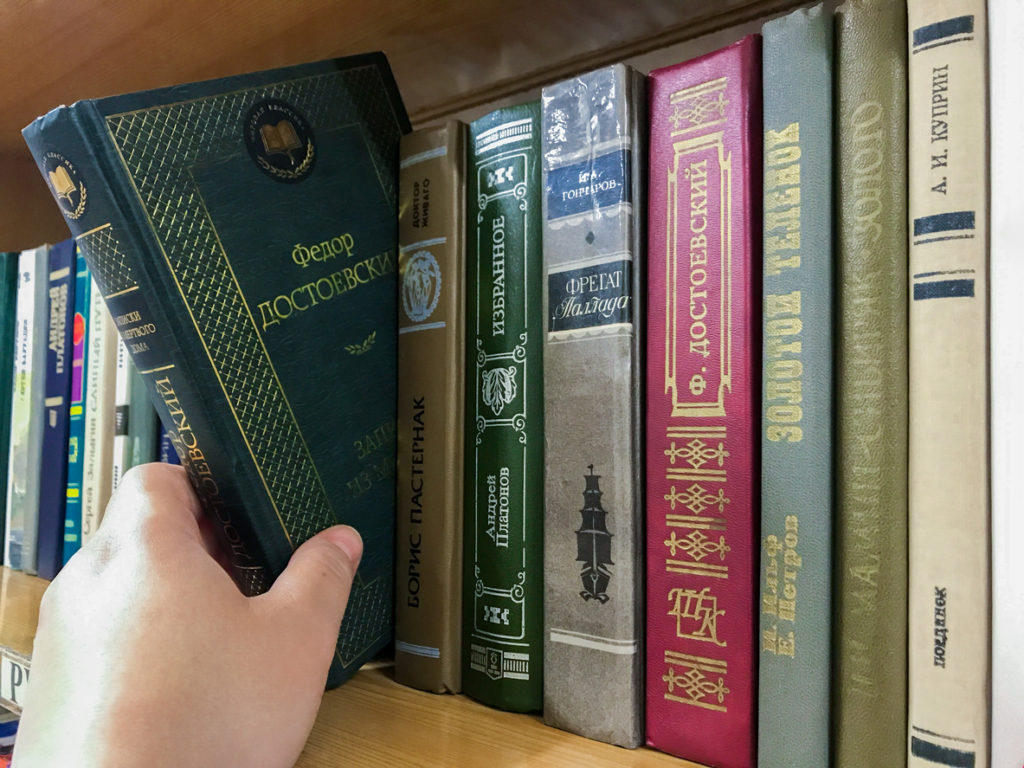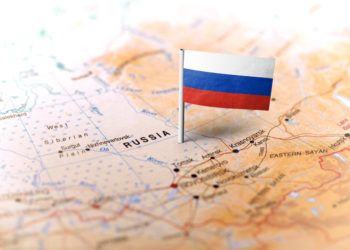Bloomberg News is reporting that the Biden administration is exploring the possibility of granting special visas to Russian scientists and engineers, with the aim of initiating or accelerating a “brain drain” from Russia of individuals critical to a modern economy and, not incidentally, modern warfare. Potential candidates for these visas would need credentials in such fields as artificial intelligence and computer security; historians and students of the Russian novel need not apply — though, speaking for myself, I get a better understanding of the Ukraine crisis by reflecting on Dostoyevsky than from reading The New York Times. Put these researchers and engineers to work in the U.S. for the benefit of the U.S. economy (and the Department of Defense) and deny the current Russian administration of the same. It’s a cunning idea, whether you like it or not, because of its asymmetric appeal: How many Americans, outside of Tucker Carlson, are likely to welcome a chance to emigrate to Russia?
Allow me to pause to interject: observation is not advocacy.

I have no idea how the game of geopolitics is played, especially against a backdrop of nuclear weaponry; it is like watching a chess game played by grandmasters, one of whom is bound to lose in the end. What has caught my attention is how the research community is being brought into this game. Research and researchers are now being weaponized as assuredly as digital networks and a chunk of uranium. This is not, as far as I can determine, how researchers like to think of themselves and their work. After all, what is the meaning of academic freedom when the academy is itself put to work for the benefit of an imperial power determined to hold sway over another imperial power?
It has already been observed, most eloquently by Lisa Hinchliffe and Roger Schonfeld on The Scholarly Kitchen, that the dream of a collaborative global order for academic research is being disrupted by the events in Ukraine. Fragmentation of the scholarly community is one thing, however; pitting empires against one another, and conscripting researchers, takes matters to a new level. On the other hand, one can argue, as we did in The Brief, that it was ever thus, that the notion of a global research community, like that of a global market, was a creature of a specific time and place, and things have moved on. If that is true, it may be a good time to think about the implications for various elements of this community. For example, what does cOAlition S look like when mapped against a world where biologists are smuggled out of Moscow and dropped down in Berkeley? In whose political interest is Open Access when world powers are attempting to deny rivals of the human capital that makes innovative research possible?
I detect a certain insidious aspect to the administration’s proposal, namely, the policy will have an impact even if it is not formally adopted. The Russian government will have read Bloomberg News and knows that emigration is being discussed to humiliate the Russian leadership, and to the extent that Russian researchers themselves learn about this, they may pause to reflect on where their loyalties lie. In other words, the proposal, even if it is not adopted, plants civil discord. What is being weaponized is not only the research community but also immigration policy and aspirations.
Bloomberg broke this story just as I was finishing up Tom Wolfe’s classic The Electric Kool-aid Acid Test, which poses the question: Are you on the bus or off the bus? That is a choice that most of us would rather not have to make, but there it is. I suspect we will be pondering that question for the foreseeable future. In the meantime, having recently reread Crime and Punishment, it’s time to move on to The Brothers Karamazov.
Discussion
8 Thoughts on "Weaponizing the Research Community"
I suspect there will be one view in the US but a rather different one in Europe. There seems to be a different view in Europe currently about relationships with Chinese scholars but no one says much – no overt disagreement
Joe, I don’t know enough about cold war science but I’m interested in what my colleagues who write about that era think of this one. Audra Wolfe is someone I’d want to hear from, and Patrick Iber. As you note in the Brief linked above the idea of a global research community is an artifact, but so too was the idea that we could make science work for democracy–in opposition to authoritarianism.
As far as I have been taught , think and known, Knowledge unites and does should not divise.
Our current era of relative openness, which we can hopefully continue to enjoy, is more of an aberration than the norm in the history of science. Since around 1938 when nuclear fission was first discovered (leading immediately to German efforts to build a nuclear bomb, and leading to the Manhattan Project in the US in 1942), scientific research has been intensely nationalized. Before this period, science research was a much smaller creature—particularly in the US—and less subject to government funding and control. US research mobilization in the 1950s and 60s was a direct response to competition with the USSR for dominance in weaponry and space. And as Anthony mentions in his comment above, US-China competition for technological supremacy has at least for the last 20 years been very much on the minds of both governments (concerns about IP theft, research spying, etc.). The potential impact to secrecy and information hoarding posed by the OA movement just hasn’t been significant or thorough enough to be noticed (think applied research from industry, which accounts for the vast majority of R&D dollars). Three great books chronicle at least part of this evolution (and I’m sure there are others): The Making of the Atomic Bomb (Richard Rhodes), American Moonshot (Douglas Brinkley), and Accessory to War (Neil deGrasse Tyson and Avis Lang).
The techno-utopianism ushered in by the Internet Age is what has given the OA movement legs and given credence to the idea that science can truly be a global enterprise that works together for the good of all mankind—in an ideal world anyway, which is less politically ideal today than yesterday. Also, as some observers like Kent Anderson and Richard Poynder have been warning for years, so much of the progress we’ve made and promised ourselves with OA needs to be critically evaluated. Can we truly get there from here, even in an ideal world?
To the extent that our designs for a world where research is shared more freely are a house of cards (which isn’t to say these designs are unrealistic, just fragile), then predicting how this house collapses will be the next great challenge for research leaders. Now that Russia is the bad guy again, and sympathies with Russia are affecting how we view our alliances and strategic interests, what of China, and also our other “research friends” like India who have so far refused to condemn the Russian invasion? This national reassessment of friend and foe won’t necessarily affect casual communication with the scientists in these countries, but it could affect collaboration. And with regard to open, I can’t see how it WON’T affect efforts to share data—to make open scholarship more than just an easier sharing of journal articles. There is going to be tremendous pushback from political leaders and government funders on the idea that US-funded (or EU-funded) research data and methods should be freely and openly shared such that the Russian government might benefit.
The only way out of this communication death spiral is for President Putin to be forced out of office (by whatever means) and for a more sensible successor to take the helm and start making amends for Russia’s actions in the Ukraine. But even if all this starts happening tomorrow, it will take years for the US and EU to figure out who is truly friend or foe again.
Does this mean the global open movement will collapse in the interim? Maybe. Or it can continue to grow as a practical movement—regional open solutions, open research networks, and open collaboration focused on particular goals like vaccines and climate change. Personally, I think these practical movements are more sustainable anyway—they have constituents willing to support them, clear goals and directions, and achievable outcomes.
So, I think we need to keep the faith. The big picture is still there—we just need to adjust our antennas to the new frequency.
There is also the issue of dual use research. When there is less trust in global partners, there will be even more wariness on things that are possibly dual use (such as some virus research). But virus research, as we know, can be essential for public health. See for example
Making Science More Open Is Good for Research—but Bad for Security
https://www.wired.com/story/making-science-more-open-good-research-bad-security/
This has been going on since the turn of the last century. The US vs Europe up to the rise of Nazi Germany and then the US and Europe vs Nazi Germany, then the space race with the US grabbing as many German rocket scientists as it could. The US and USSR coopting each other’s scientists if they could. The 2000 crisis of needing COBOL writers which were plentiful in the USSR/Russia and granting visas. What is different here it seems to me is the open recruiting with an open reason.
Joe, I’m a bit confused about what is new here. During WW2 and the Cold War, scientists and engineers were pressed into serving their country with urgency — the Manhattan Project being the most obvious example. And of course, refugees from the horrors of the Nazi system were among those who joined in the effort. Anyway, the democracies have weaponized our financial systems through extensive sanctions as part of a nearly whole-of-society effort to oppose aggression. I guess I am not tracking on why science would be exempt. I feel like I hear that Russian scientists and academics secretly oppose Putin but can’t speak up. This gives them the incentive to vote with their feet. I wonder what they will do.
Putin’s Russia is not materially different from Brezhnev’s Russia. Putin has said repeatedly that the fall of the Soviet Union was the greatest tragedy of the 20th century. He’s been hard at work trying hard to get back Brezhnev’s Russia – just ask the Ughers, the people of Chechnya, Georgia, Crimea, and Ukraine. I’m not even including the journalists and political opponents assassinated (bullets, poisons, 6th floor windows) in Russia and abroad.
If scientists want to defect – which is the correct word – I have no problem with making that possible. This kind of pearl-clutching from the safety of the west is, frankly, mildly obscene.



